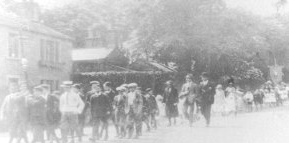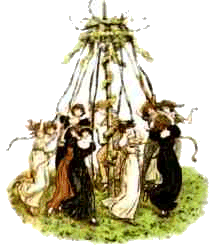|
Dancing at Whitsun
It's fifty long springtimes since she was a bride
But still you may see her at each Whitsuntide
In a dress of white linen with ribbons of green,
As green as her
memories of loving
The feet that were nimble tread carefully now,
As gentle a measure as age will allow,
Through groves of white blossoms,
by fields of young corn,
Where once she was pledged to her true-love.
The fields they stand empty, the hedges grow (go) free--
No young men to turn them or pastures go see (seed)
They
are gone where the forest of oak trees before
Have gone, to be wasted in battle.
Down from the green farmlands and from their loved ones
Marched husbands and brothers and fathers and sons.
There's
a fine roll of honor where the Maypole once stood,
And the ladies go dancing at Whitsun.
There's a straight row of houses in these latter days
All covering the downs where the sheep used to graze.
There's
a field of red poppies (a gift from the Queen)
But the ladies remember at Whitsun,
And the ladies go dancing at Whitsun.
[words by John Austin Marshall]
© Copyright John Austin Marshall
 |
 |
|
Whitsuntide

|
| Whitsuntide Parade |
|
|
The Origins
Pentecost or Whitsun is observed on the seventh Sunday after Easter. The word Pentecost
has its roots in the Greek "pentekoste" meaning the fiftieth day after Easter. Whit Sunday commemorates the coming
of the Holy Spirit in the form of flames to the Apostles, as recorded in the New Testament. The recent adoption of a Late
Spring Bank Holiday on the last Monday in May is an attempt to deal with the fact that Whitsuntide is a moveable feast dependent
on the date of Easter. Although it is no longer necessarily at the church's Whitsuntide, the general public still refers to
this holiday as "Whit Monday."
Customs & Traditions
Two main traditions persist, particularly in the North of England - Whit Walks
and Whitsun Ales. Whit weekend, being a three-day break, is, like May Day, an important date on the Morris-Dancing calendar, and it also marks the start of the Well Dressing season.
Whit Walks are now confined almost exclusively to the industrial
towns of northern England although they were once much more widespread.
The whole community assembles at a central point
- usually a school or church - and parades around the town or village. The parades will be led by a brass band with the clergy
and local dignitaries, followed by the uniformed organisations - Scouts and Guides, Boy's Brigade etc., and finally local
families all in their best new clothes with the girls dressed in white, Whitsun being a corruption of White Sunday. The Whit
Walkers will very likely make their way to the local green or playing field and there the "Whitsun Ale" will begin.
A Whitsun Ale is, despite its name, not a type of beer! Whitsun Ales
are country fairs, with sports and competitions, Morris dancing displays, music and of course socialising, eating and drinking,
in fact a major event on the social calendar.
After the English Civil War the Puritan government banned all types
of merrymaking but after the Restoration of Charles II, Whitsun Ales became a major event - helped no doubt by the fact that
Charles was born on a Whit Monday and so encouraged the celebration. The Ales are often sponsored by a pub or brewery, giving
rise to the misconception that the event is named for the beer!
|
|
 |
 |
|
 |
|
 |
 |
|
|
|
probably the mosr comprehensive
webite on the net, regarding the
"war to end all wars"
Comprising the main Allied
attack
on the Western Front during
1916,
famous chiefly on account
of the
loss of 58,000 British troops
(one third of them killed)
on the
first day of the battle, 1
July 1916,
which to this day remains
a
one-day record
"Squire nagged and bullied
till I went to fight,
(Under Lord Derby's scheme).
I died in hell -
(They called it Passchendaele)."
the end of innocence
|
|
 |
 |

 |
 |
| |
|
morris on, the son, the grandson
and the great grandson
a great explanation of
this holiday from the students
at Woodlands School in
Tonbridge, Kent. this is a truly
amazing interactive website
|
|
 |
 |


|
 |
|
|
 |
|
|
|

